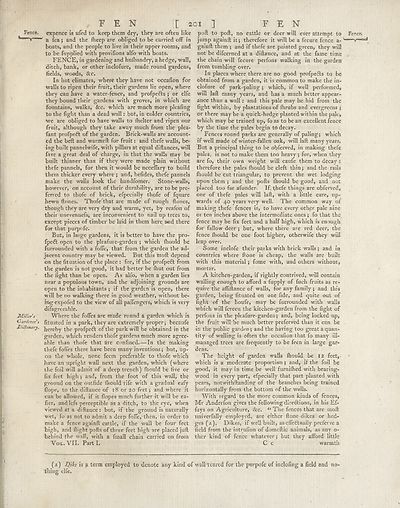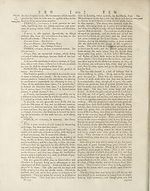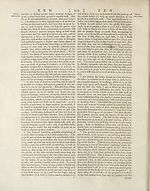Encyclopaedia Britannica > Volume 7, ETM-GOA
(223) Page 201
Download files
Complete book:
Individual page:
Thumbnail gallery: Grid view | List view

Fence.
Miller's
Jjitlonary.
FEN [2
expence is ufed to keep them dry, they are often like
a fea; and the ftieep are obliged to be carried off in
boats, and the people to live in their upper rooms, and
to be fupplied with provifions alfo with boats.
FENCE, in gardening and hulbandry, a hedge, wall,
ditch, bank, or other inclofure, made round gardens,
fields, woods, &c.
In hot climates, where they have not occafion for
walls to ripen their fruit, their gardens lie open, where
they can have a water-fence, and profpefts ; or elfe
they bound their gardens with groves, in which are
fountains, walks, &c. which are much more pleafing
to the fight than a dead wall: but, in colder countries,
we are obliged to have walls to ftielter and ripen our
fruit, although they take away much from the plea-
fant profpeft of the garden. Brick-walls are account¬
ed the beft and warmeft for fruit: and thefe walls, be¬
ing built pannelwife, with pillars at equal diftances, will
fave a great deal of charge, in that the walls may be
built thinner than if they were made plain without
thefe pannels, for then it would be neceffary to build
them thicker every where ; and, befides, thefe pannels
make the walls look the handfomer. Stone-walls,
however, on account of their durability, are to be pre¬
ferred to thofe of brick, efpecially thofe of fquare
hewn ftones. Thofe that are made of tough ftones,
though they are very dry and warm, yet, by reafon of
their unevennefs, are inconvenient to nail up trees to,
except pieces of timber be laid in them here aed there
for that purpofe.
But, in large gardens, it is better to have the pro-
fpeft open to the pleafure-garden ; which fhould be
furrounded with a foffe, that from the garden the ad¬
jacent country may be viewed. But this muft depend
on the fituation of the place : for, if the profpeft from
the garden is not good, it had better be (hut out from
the fight than be open. As alfo, when a garden lies
near a populous town, and the adjoining grounds are
open to the inhabitants ; if the garden is open, there
will be no walking there in good weather, without be¬
ing expofed to the view of all paiTengers, which is very
difagrceable.
Where the fofles are made round a garden which is
fituated in a park, they are extremely proper; becaufe
hereby the prafpeA of the park will be obtained in the
garden, which renders thofe gardens much more agree¬
able than thofe that are confined.—In the making
thefe foffes there have been many inventions; but, up¬
on the whole, none feem preferable to thofe which
have an upright wall next the garden, which (where
the foil will admit of a deep trench) fhould be five or
fix feet high; and, from the foot of this w’all, the
ground on the outfide flaould rife with a gradual eafy
flope, to the diftance of 18 or 20 feet; and where it
can be allowed, if it flopes much farther it will be ea-
fier, andlefs perceptible as a ditch, to the eye, when
viewed at a diftance: but, if the ground is naturally
wet, fo as not to admit a deep fofle,'then, in order to
make a fence againft cattle, if the wall be four feet
high, and flight pofts of three feet high are placed juft
behind the wall, with a fmall chain carried on from
Vol.VII. Parti.
01 ] FEN
poll to poft, no cattle or deer will ever attempt to
jump againft it; therefore it will be a fecure fence a-
gainft them ; and if thefe are painted green, they will
not be difeerned at a diftance, and at the fame time
the chain will fecure perfons walking in the garden
from tumbling over.
In places where there are no good profpefts to be
obtained from a garden, it is common to make the in¬
clofure of park-paling ; which, if well performed,
will laft many years, and has a much better appear¬
ance than a wall: and this pale may be hid from the
fight within, by plantations of ftrrubs and evergreens ;
or there may be a quick-hedge planted within the pale,
which may be trained up, fo as to be an excellent fence
by the time the pales begin to decay.
Fences round parks are generally of paling; which
if well made of winter-fallen oak, will laft many years.
But a principal thing to be obferved, in making thefe
pales, is not to make them too heavy ; for, when they
are fo, their own weight will caufe them to decay :
therefore the pales ftiould be cleft thin; and the rails
ftiould be cut triangular, to prevent the wet lodging
upon them ; and the pofts fhould be good, and not
placed too far afunder. If. thefe things are obferved,
one of thefe pales will laft, with a little care, up¬
wards of 40 years very well. The common way of
making thefe fences is, to have every other pale nine
or ten inches above the intermediate ones; fo that the
fence may be fix feet and a half high, which is enough
for fallow deer ; but, where there are red deer, the
fence ftiould be one foot higher, otherwife they will
leap over.
Some inclofe their parks with brick walls; and in
countries where ftone is cheap, the walls are built
with this material; fome with, and others without,
mortar.
A kitchen-garden, if rightly contrived, will contain
walling enough to afford a fupply of fuch fruits as re¬
quire the afliftance of walls, for any family; and this
garden, being fituated on ©ne fide, and quite out of
fight of the Loufe, may be furrounded with walls
wbich will fereen the kitchen-garden from the fight of
perfons in the pleafure-garden; and, being locked up,
the fruit will be much better preferved than it can be
in the public garden; and the having too great a quan¬
tity of walling is often the occafion that fo many ill-
managed trees are frequently to be feen in large gar¬
dens.
The height of garden walls ftiould be 12 feet,
which is a moderate proportion; and, if the foil be
good, it may in time be well furnifhed with bearing-
wood in every part, efpecially that part planted with
pears, notwithftanding of the branches being trained
horizontally from the bottom of the walls.
With regard to the more common kinds of fences,
Mr Anderfon gives the following directions, in his Ef-
fays on Agriculture, &c. “ The fences that are moft
univerfally employed, are either ftone dikes or hed¬
ges (a). Dikes, if well built, as effectually preferve a
field from the intrufion of domeftic animals, as any o-
ther kind of fence whatever; but they afford little
C c warmth
(a) Dike is a term employed to denote any kind of wall teared for the purpofe of inclofing a field and no¬
thing elfe.
Miller's
Jjitlonary.
FEN [2
expence is ufed to keep them dry, they are often like
a fea; and the ftieep are obliged to be carried off in
boats, and the people to live in their upper rooms, and
to be fupplied with provifions alfo with boats.
FENCE, in gardening and hulbandry, a hedge, wall,
ditch, bank, or other inclofure, made round gardens,
fields, woods, &c.
In hot climates, where they have not occafion for
walls to ripen their fruit, their gardens lie open, where
they can have a water-fence, and profpefts ; or elfe
they bound their gardens with groves, in which are
fountains, walks, &c. which are much more pleafing
to the fight than a dead wall: but, in colder countries,
we are obliged to have walls to ftielter and ripen our
fruit, although they take away much from the plea-
fant profpeft of the garden. Brick-walls are account¬
ed the beft and warmeft for fruit: and thefe walls, be¬
ing built pannelwife, with pillars at equal diftances, will
fave a great deal of charge, in that the walls may be
built thinner than if they were made plain without
thefe pannels, for then it would be neceffary to build
them thicker every where ; and, befides, thefe pannels
make the walls look the handfomer. Stone-walls,
however, on account of their durability, are to be pre¬
ferred to thofe of brick, efpecially thofe of fquare
hewn ftones. Thofe that are made of tough ftones,
though they are very dry and warm, yet, by reafon of
their unevennefs, are inconvenient to nail up trees to,
except pieces of timber be laid in them here aed there
for that purpofe.
But, in large gardens, it is better to have the pro-
fpeft open to the pleafure-garden ; which fhould be
furrounded with a foffe, that from the garden the ad¬
jacent country may be viewed. But this muft depend
on the fituation of the place : for, if the profpeft from
the garden is not good, it had better be (hut out from
the fight than be open. As alfo, when a garden lies
near a populous town, and the adjoining grounds are
open to the inhabitants ; if the garden is open, there
will be no walking there in good weather, without be¬
ing expofed to the view of all paiTengers, which is very
difagrceable.
Where the fofles are made round a garden which is
fituated in a park, they are extremely proper; becaufe
hereby the prafpeA of the park will be obtained in the
garden, which renders thofe gardens much more agree¬
able than thofe that are confined.—In the making
thefe foffes there have been many inventions; but, up¬
on the whole, none feem preferable to thofe which
have an upright wall next the garden, which (where
the foil will admit of a deep trench) fhould be five or
fix feet high; and, from the foot of this w’all, the
ground on the outfide flaould rife with a gradual eafy
flope, to the diftance of 18 or 20 feet; and where it
can be allowed, if it flopes much farther it will be ea-
fier, andlefs perceptible as a ditch, to the eye, when
viewed at a diftance: but, if the ground is naturally
wet, fo as not to admit a deep fofle,'then, in order to
make a fence againft cattle, if the wall be four feet
high, and flight pofts of three feet high are placed juft
behind the wall, with a fmall chain carried on from
Vol.VII. Parti.
01 ] FEN
poll to poft, no cattle or deer will ever attempt to
jump againft it; therefore it will be a fecure fence a-
gainft them ; and if thefe are painted green, they will
not be difeerned at a diftance, and at the fame time
the chain will fecure perfons walking in the garden
from tumbling over.
In places where there are no good profpefts to be
obtained from a garden, it is common to make the in¬
clofure of park-paling ; which, if well performed,
will laft many years, and has a much better appear¬
ance than a wall: and this pale may be hid from the
fight within, by plantations of ftrrubs and evergreens ;
or there may be a quick-hedge planted within the pale,
which may be trained up, fo as to be an excellent fence
by the time the pales begin to decay.
Fences round parks are generally of paling; which
if well made of winter-fallen oak, will laft many years.
But a principal thing to be obferved, in making thefe
pales, is not to make them too heavy ; for, when they
are fo, their own weight will caufe them to decay :
therefore the pales ftiould be cleft thin; and the rails
ftiould be cut triangular, to prevent the wet lodging
upon them ; and the pofts fhould be good, and not
placed too far afunder. If. thefe things are obferved,
one of thefe pales will laft, with a little care, up¬
wards of 40 years very well. The common way of
making thefe fences is, to have every other pale nine
or ten inches above the intermediate ones; fo that the
fence may be fix feet and a half high, which is enough
for fallow deer ; but, where there are red deer, the
fence ftiould be one foot higher, otherwife they will
leap over.
Some inclofe their parks with brick walls; and in
countries where ftone is cheap, the walls are built
with this material; fome with, and others without,
mortar.
A kitchen-garden, if rightly contrived, will contain
walling enough to afford a fupply of fuch fruits as re¬
quire the afliftance of walls, for any family; and this
garden, being fituated on ©ne fide, and quite out of
fight of the Loufe, may be furrounded with walls
wbich will fereen the kitchen-garden from the fight of
perfons in the pleafure-garden; and, being locked up,
the fruit will be much better preferved than it can be
in the public garden; and the having too great a quan¬
tity of walling is often the occafion that fo many ill-
managed trees are frequently to be feen in large gar¬
dens.
The height of garden walls ftiould be 12 feet,
which is a moderate proportion; and, if the foil be
good, it may in time be well furnifhed with bearing-
wood in every part, efpecially that part planted with
pears, notwithftanding of the branches being trained
horizontally from the bottom of the walls.
With regard to the more common kinds of fences,
Mr Anderfon gives the following directions, in his Ef-
fays on Agriculture, &c. “ The fences that are moft
univerfally employed, are either ftone dikes or hed¬
ges (a). Dikes, if well built, as effectually preferve a
field from the intrufion of domeftic animals, as any o-
ther kind of fence whatever; but they afford little
C c warmth
(a) Dike is a term employed to denote any kind of wall teared for the purpofe of inclofing a field and no¬
thing elfe.
Set display mode to:
![]() Universal Viewer |
Universal Viewer | ![]() Mirador |
Large image | Transcription
Mirador |
Large image | Transcription
Images and transcriptions on this page, including medium image downloads, may be used under the Creative Commons Attribution 4.0 International Licence unless otherwise stated. ![]()
| Encyclopaedia Britannica > Encyclopaedia Britannica > Volume 7, ETM-GOA > (223) Page 201 |
|---|
| Permanent URL | https://digital.nls.uk/189124128 |
|---|
| Attribution and copyright: |
|
|---|
| Description | Ten editions of 'Encyclopaedia Britannica', issued from 1768-1903, in 231 volumes. Originally issued in 100 weekly parts (3 volumes) between 1768 and 1771 by publishers: Colin Macfarquhar and Andrew Bell (Edinburgh); editor: William Smellie: engraver: Andrew Bell. Expanded editions in the 19th century featured more volumes and contributions from leading experts in their fields. Managed and published in Edinburgh up to the 9th edition (25 volumes, from 1875-1889); the 10th edition (1902-1903) re-issued the 9th edition, with 11 supplementary volumes. |
|---|---|
| Additional NLS resources: |
|

